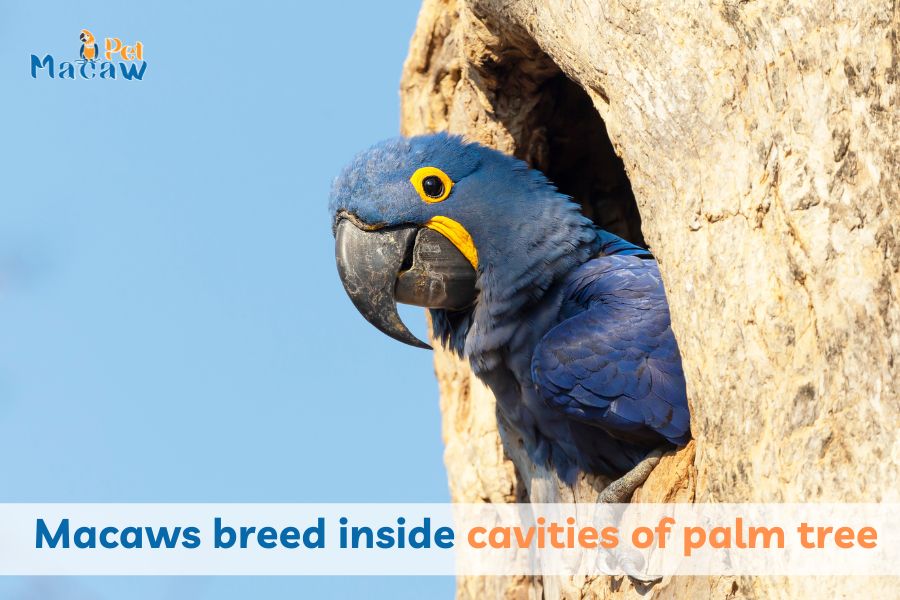Last Updated on April 23, 2023
Macaw parrots being one of the largest parrots in the world need quite a space to lay eggs and take care of their babies. So their nests are also large, unlike most parrots. Let’s talk about where and how macaw parrots nest.
Macaws nest in the cavities of tall trees, earthen banks, and cliffs. Mostly, they nest in palm tree cavities; 20-30 feet above the ground.

Let’s discuss why macaws nest inside cavities and what advantages nesting in cavities gives them.
Macaws Living in Cavities: What Gives?
Macaws prefer nesting at height inside cavities as they are comparatively more secure than exposed nests. This is essential for macaws as there are predators that hunt macaws. Moreover, human hunters also hunt them down and catch them for illegal trade.
Cavities In Tall Trees
Macaws find cavities in tall deciduous or non-deciduous trees in rainforest areas. Tree cavities are a common place for macaws to live.
These cavities are produced naturally as a result of wood decomposition. Some of these cavities are of suitable size for macaws to live in and some are under-sized. Macaws chew wood and excavate the cavities up to their required size. Their sharp-pointed and strong beaks serve as excellent cutting tools.
Earthen banks and cliff cavities
Macaws also find cavities in cliffs and earthen banks. They prefer natural holes or crevices in cliffs that are high up from the ground. Inside cliff cavities, macaws feel more protective as they are hard and strong than wood cavities.
Some macaws like Lear’s macaw, Green-winged macaw, and Military macaw prefer living in the cliff cavities.
Macaws do not make the cliffs and bank cavities on their own. They search for the empty cavities between the cliffs that are natural and suitable for their size.
Benefits of Nesting In Cavities
Macaws find cavities in tall trees for their protection and survival. For macaws, several benefits of living in cavities are listed below.
- Cavities protect the macaws from harsh weather conditions.
- Macaws can hide in cavities to protect themselves against predators.
- The environment in cavities facilitates egg-laying and then egg-hatching.
- Cavities are safe to raise macaw chicks till they become independent.
Final Thoughts
Since macaws prefer breeding in cavities inside trees, most macaw breeders give their breeding pairs wooden nest boxes. These boxes are somewhat closer to what macaws prefer for nesting in the wild. If macaws are not provided nest boxes, they either don’t breed at all or lay eggs on the bottom of the cage and abandon them.
Bilal is an aviculturist who loves to write in free time. His personal experience with bird care and breeding enables him to share valuable tips. So far, he has contributed more than 100 blogs to this site.
His goal is to promote bird-keeping and save endangered species.
